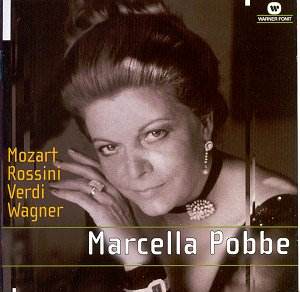I have an old Cetra LP with three of these performances,
including "Selva opaca" which opens the present CD.
I hadn’t been listening for long before the conviction came upon
me that I didn’t remember it being like this at all, so out came
the old black disc. On LP we hear a voice which has a certain
edge, almost soubrette-like, very clear and forwardly placed.
On CD we hear a voice which has more body, roundness and sweetness.
One would swear that the microphones have been shifted back a
few yards; words are a little less clear, as befits a voice heard
from a greater distance, and the rounder sound suggests that the
vocal production itself is more backward.
Now, I am all in favour of taming the shrillness
characteristic of early Cetra LPs, and of smoothing out distortion,
of which the LP had many uncomfortable moments. But when the two
versions are so different that our perception of the voice and
even of the singer’s actual vocal production changes, then I can
only describe the situation as alarming. A voice can be "created"
just by twiddling knobs!
Obviously, one of the two gives a false impression,
but which? My hunch is that the LP is closer to the truth. The
singer seems more "present" in my listening room, and
emerges as a more vivid interpreter, strikingly so in Leonora’s
scene and aria "Timor di me … D’amor sull’ali rosee";
on LP she grabbed my attention and held it, on CD her singing,
well-schooled as it is, seems a little sleepy. The effect might
be easier on the ear, but a layer of cotton wool seems to have
got between me and the singer. I find the implications of this
extremely disturbing; it would be interesting to have the impressions
of somebody who actually heard Pobbe’s singing and retains clear
memories of it.
Some readers might be asking at this point who
Marcella Pobbe was (or rather is, for she is still with us). She
was born in Vicenza in 1927 (1921 and 1931 have also been tried)
and made her debut in Spoleto as Marguérite in 1948. She
reached La Scala in the 1954-5 season, appearing as Elsa, Agathe
and Betsabea in the local première of Milhaud’s "David".
Her Met debut came in 1958 as Mimì. By this time she was
having an on-and-off affair with Nicolai Gedda; in 1959 it was
off and she turned down the role of Elisabetta (in "Don Carlo")
at the Met to avoid singing alongside him. She was not invited
to appear there again. This was not the only piece of bad luck
to come her way. In one of the very first divorces allowed in
ultra-Catholic Italy she rid herself of a wealthy husband quite
unnecessarily – the good man dropped dead the day after the divorce
papers came through! Her ultimate misfortune was to belong to
that select group – including also Carteri, Cerquetti, Frazzoni
and Gavazzi – who had to make their way in a world dominated by
Callas and Tebaldi. I have not been able to trace the date of
her last appearance but her temperament has been undimmed by time.
With the cameras and recording equipment full on her she protested
that her interviewer was asking "such stupid questions";
more than actually "stupid", the hapless man’s questions
were insufficiently centred upon the great lady herself!
Leaving aside the technical questions raised
above, it can be heard that Pobbe was able to spin long, pure
legato lines, but also had agility when it was called for. As
transferred here, it is inevitably the gentler items that make
most effect; the "Falstaff" aria is meltingly lovely.
The LP I have referred to also had items by Puccini and Cilea
which might have been chosen in place of the two Wagner items
which, being sung in Italian, will not be of great interest to
the wider international public, especially when they are so flabbily
conducted. Apologies are offered for the quality of the sound
in the Mozart, which sounds like an air-check (can’t the RAI find
the original tapes?). In spite of this and lack-lustre conducting
I felt in a way that I was getting a truer picture of what it
might be like to sit in the theatre and listen to Marcella Pobbe.
She proves an exquisite Mozartian, her "Porgi amor"
deeply felt and beautifully shaded, her coloratura easily thrown
off in the final pages of Donna Anna’s aria.
Pobbe’s recording career was linked to Cetra
and the RAI. Of several complete sets for the former, that of
Boito’s "Mefistofele",
with Tagliavini and Neri under Questa, is currently available;
televised operas for the latter include “Adriana Lecouvreur”.
She also took part, alongside Nicola Rossi-Lemeni, in a Turin
Radio performance of Dvořák’s “Te Deum” under Karel Ančerl
which would be worth putting out on CD. Her repertoire
also included R. Strauss’s "Four Last Songs"; I wonder
if a recording exists? She is definitely a singer worthy of remembrance,
but in view of my perplexities over the transfers I feel I can
only recommend this disc to seasoned collectors who will have
the competence and experience to answer some of the questions
I have posed.
Christopher Howell

